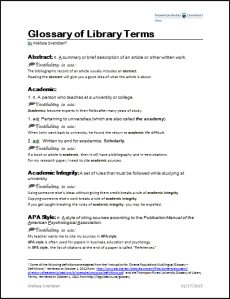 This Glossary of Library Terms grew out of my experience teaching information literacy skills to ESL students at Thompson Rivers University. There seemed to be little point in talking to these students about the library when they were clearly having difficulty with the very words that I was using — vocabulary that includes a lot of words that are either not on the ESL Academic Word List or have specialized meanings particular to the library context.
This Glossary of Library Terms grew out of my experience teaching information literacy skills to ESL students at Thompson Rivers University. There seemed to be little point in talking to these students about the library when they were clearly having difficulty with the very words that I was using — vocabulary that includes a lot of words that are either not on the ESL Academic Word List or have specialized meanings particular to the library context.
For instance, the word “Reference” has no fewer than five distinct but related meanings in a library context, and functions variously as a noun, an adjective and a verb. So it really was no wonder that the students nodded politely but clearly hadn’t a clue what I was talking about! This glossary is my attempt to address the issue head on.
I quickly discovered that without exercises of some sort to introduce the students to the Glossary, they would simply file it away and forget about it. Time is short in one-off library instruction sessions, but I find that in the process of reviewing the answers to these exercises, I am able to impart a lot of crucial information about how to use the Library.
I found developing this glossary surprisingly difficult, because each definition has to be presented at a lesser level of complexity than the vocabulary being defined. Otherwise, a glossary risks becoming circular: What is a reference? A reference is a citation. And what is a citation? A citation is a reference. This sort of circularity crops up in many glossaries of library terms because it is difficult to avoid, but it is not particularly helpful to the user.
The “Vocabulary in Use” additions to each definition are intended to simulate vocabulary use at the reference desk or in the classroom so, in contrast to the somewhat formal tone of the definition itself, the examples of the word in use are deliberately presented in a more casual register. Ultimately, I would like to post this glossary as a webpage with sound files attached, with slow, formal readings of the definitions, and faster, more casual readings of the “Vocabulary in use.”